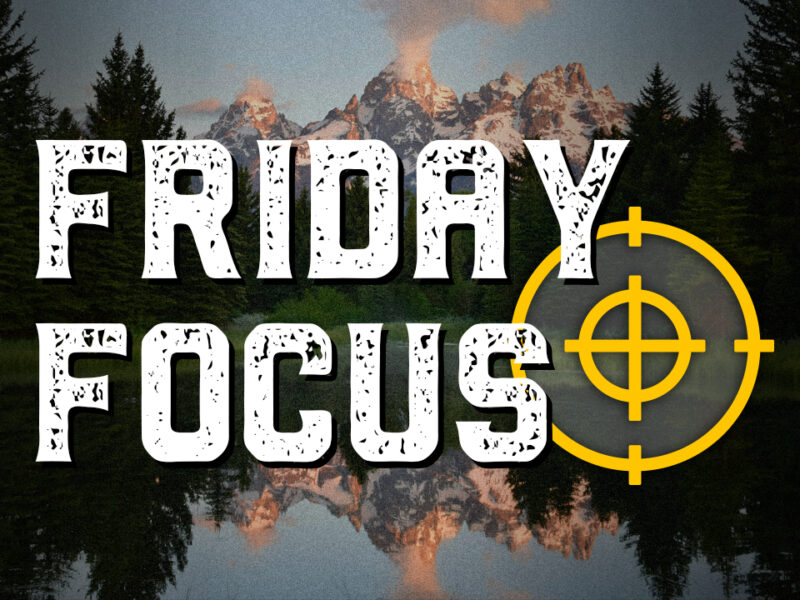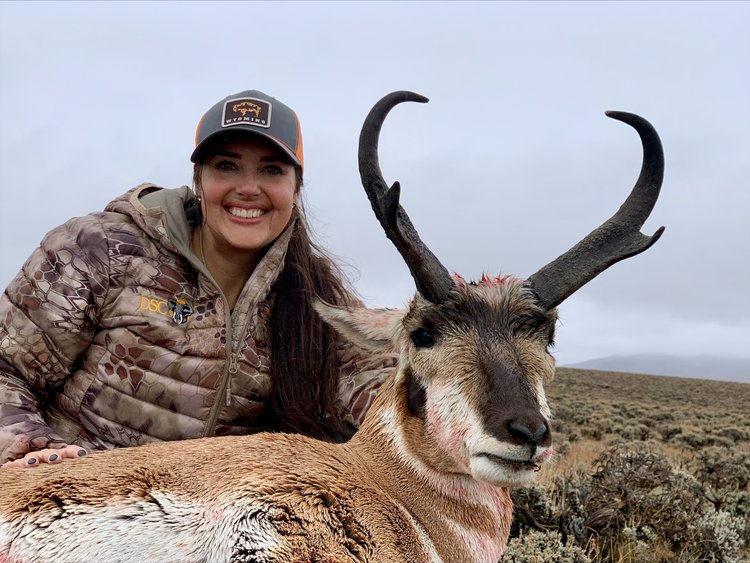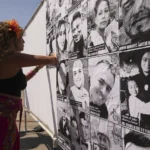Female Hunters Dominating the Field
Wyoming Dallas Safari Club Executive Director Jamie Moralez wants to see more women hunting and getting outdoors
- Published In: Other News & Features
- Last Updated: Oct 14, 2022

By Jennifer Kocher
Special to the Wyoming Truth
Female hunters and anglers are the fastest-growing demographic in Wyoming, and Jamie Moralez would like to see those numbers continue to climb. Moralez is the executive director of the Wyoming branch of the Dallas Safari Club, a conservation organization funded by hunters around the world, with over 200 members statewide.
Hunting and being outdoors is in her blood. Some of Moralez’s earliest memories include sleeping on the floor of her father’s truck with her sister, as he headed out for a hunt or to scout for elk in the early, crisp autumn mornings.
Though she’s been shooting small game animals since the time she could walk, Moralez had her first big game hunt last year at age 37 when she harvested an antelope. This year, she’s looking to fill a cow elk tag and another antelope.
Moralez holds a B.A. in elementary education from the University of Wyoming. She leveraged her master’s degree in education from Grand Canyon University to spend six years teaching elementary school in Natrona County, but now works as an office manager at Wyoming Health Fairs/Wellness Health Fairs in Casper.
The Wyoming Truth caught up with Moralez to discuss her first big game hunt, some Dallas Safari Club projects and why she encourages other women to get outdoors. What follows are excerpts from the interview.
How did you become interested in hunting and outdoor adventuring?

Moralez: I guess hunting has just always been a part of my life. My parents owned a meat processing plant here in Casper called Indian Ice. So, we were constantly around men and women in that industry in general. We also had a taxidermist just across the parking lot, and so my falls were just flooded with people who hunt and people who eat meat. This was just part of what we did. In the summertime, my parents sold ice. They were really hard workers and didn’t take a lot of time off, but any extra time as a family was spent in the outdoors, whether that was arrowhead hunting or throwing in a line to try to catch some fish. All of my memories pretty much are spending hours outdoors with my family.
What was it like to grow up in a meat processing plant?
Moralez: I have vivid memories of spending hours and hours down at the processing plant helping out when needed. My sister and I were young, but I remember us literally playing hide and seek and running through the meat locker in between the rows of hanging carcasses. Even going to school for show and tell, I was able to bring eyeballs and cool stuff like that.
Last fall was your first big game hunt, which is a little surprising given your family history. What compelled you to want to put in for a big game tag last year?
Moralez: Really, it was my boyfriend, Patrick Ginder. He is an outfitter and hunts differently than my family hunts, because he’s very much about the adventure and the experience . . . He has so much respect for the animal and knows more about these animals than anybody that I know. Not that my family didn’t, it’s just different with him. I respect that, and so I feel like I started appreciating the animals more than I had before through him.
. . . Last year, I drew my first antelope tag [Area 63], and Patrick took me out. It was just an antelope, so it’s not as intense as if you’re doing like a big timber elk hunt or something like. I also wasn’t looking for a record-book antelope, but there was one, a heart-shape buck, that I just really loved his shape. And so that’s the one that we went after. We did like a short stalk – probably like 600 yards – and I got within range and made like a 320-yard shot.
How did it feel to pull the trigger?
Moralez: There was so much energy and enthusiasm leading up to the hunt and preparation in making sure that I was shooting properly. I wanted to make a great first shot . . . I wasn’t sure how it was going to feel after I pulled the trigger because I do love animals and I respect them so much. I had all these different thoughts, like, “Am I going to be upset? Or am going to be excited?” I felt like I was hyping it up, you know, and wondering how I was going to feel. And truly, I felt calm the whole time. After I pulled the trigger, I was like, “I just did it…it just happened.” It was almost this primal feeling of excitement, knowing that I get to harvest an animal and take it home to help feed my family in the most organic way possible.
The Wyoming Dallas Safari Club was formed in 2018 by Keith Garlick, your employer who named you the executive director. What are some of the projects the club sponsors?
Moralez: I’ve been with the group for about three years, and a big part of our mission statement is to involve more youth and more women in hunting and getting outdoors, as well as education and conservation. We started a women’s sector called Women in the Field. What we’re trying to do is get more women together who have the same type of [outdoor] lifestyle. We want them to feel more comfortable being involved in doing these types of things, whether they’re seasoned or brand new, just like me.
What are some of the barriers facing female hunters? How do they get around them?
Moralez: . . . Part of what’s holding us back is the lack of [women mentors]. It’s not that I don’t think that guys are great, because they obviously are great mentors. But it would be awesome to see more women leaders taking on these roles. I’m hoping someday I’m going to be a mentor type. . .
I guess the key is becoming educated, learning the land mapping and just keep doing it. That’s the only thing you can do, right? Is put yourself in that situation. And I guess one day there will be a day when you just pull the trigger and go out on your own. There are some women who, I think, just enjoy spending time with their family or being present in a situation. But I do truly feel in my heart of hearts that there are many women who are wanting to do this on their own —just by themselves or with other women.
What’s your favorite game meat?
Moralez: That’s a hard one. I love them all so much. It will be between elk and whitetail [deer]. We’ve had some whitetail this past season that was probably my favorite, so sometimes it depends on how long the meat has been outside and what the animal has been eating.













